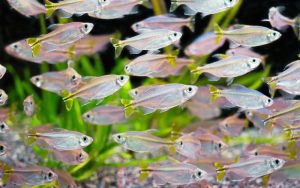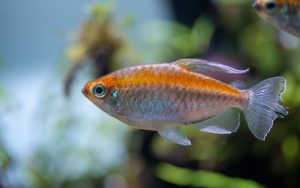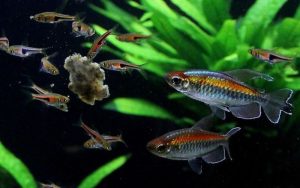Do mystery snails eat fish poop? Many fish keepers may wonder about the role of snails in cleaning an aquarium. One common question that arises is: do snails eat fish poop in aquariums? The answer to this question may surprise some, as snails play a crucial role in maintaining a healthy aquarium ecosystem. snails don’t eat fish poop. They prefer algae, decaying plants, and leftover fish food. Adding snails won’t reduce fish waste in an aquarium.
In this article, we will delve into the truth behind whether snails consume fish waste in aquariums or not.
We will explore the diet of snails, their behavior towards fish waste, and how they contribute to the overall cleanliness of the tank.
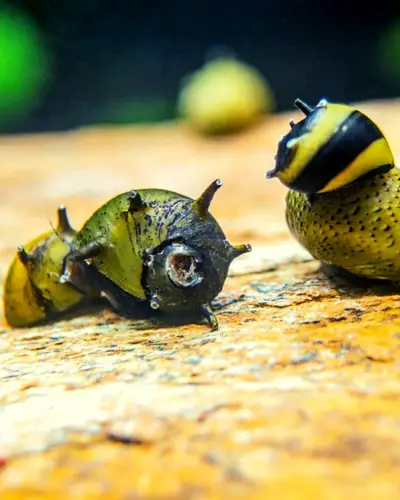
Understanding the role of snails in aquariums can help hobbyists make informed decisions about their tank management and the selection of tank mates.
So, let’s uncover the mystery of whether snails eat fish poop in aquariums and discover the important role they play in maintaining a balanced aquatic environment.
Table of Contents
ToggleDo Snails Eat Fish Poop in Aquarium?
Does snail eat fish poop? Snails do not typically consume fish waste within an aquarium setting. While snails are beneficial in maintaining a balanced ecosystem by consuming algae and decaying matter, fish waste, including their excrement, is not a primary food source for snails.
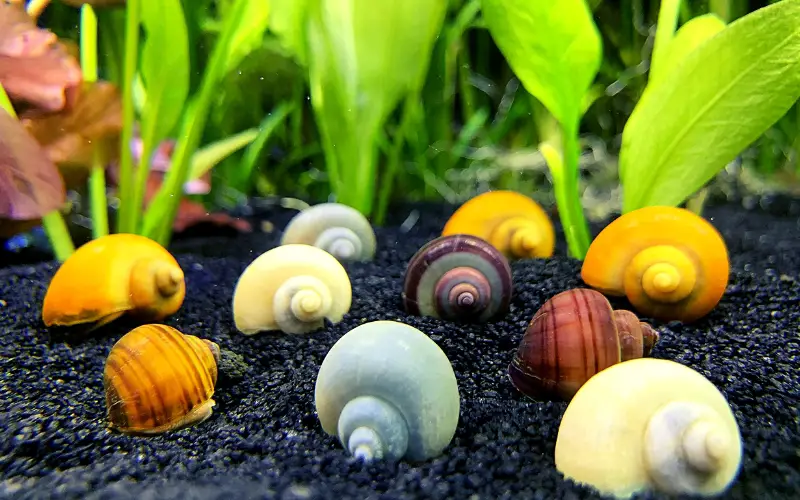
Instead, snails primarily feed on detritus, algae, leftover fish food, and decaying plant matter. Their diet helps keep the aquarium clean and reduces excess organic material, providing a healthier environment for fish and other aquatic inhabitants.
What Do Freshwater Aquarium Snails Eat?
Freshwater aquarium snails are like tiny little janitors for your tank, happily munching on various things to keep it clean! Here’s a breakdown of their typical diet:
Algae Buffet: Most snail species relish various types of algae, from green hair algae to brown diatoms, growing on surfaces like glass, rocks, and even decorations. They’re great algae cleaners!
Leftover Feast: They’re happy to gobble up any uneaten fish food that settles at the bottom of the tank, helping to prevent waste buildup and potential water quality issues.
Plant Detritus: Older leaves and other organic matter naturally break down as live plants grow. Snails readily consume this decaying plant material, contributing to the tank’s natural decomposition process.
Be Careful with Plants: While most snails won’t bother healthy, growing plants, some species might munch on softer-leaved varieties if their usual food sources are scarce. So, research the specific snail species you have and their plant compatibility.
Additional Treats: You can occasionally supplement their diet with blanched vegetables like spinach, kale, or zucchini. These provide extra nutrients and variety but remember to remove uneaten portions to avoid water quality problems.
Calcium Crunch: Snails need calcium for healthy shell growth. If your water lacks calcium, consider adding cuttlebone to the tank or providing calcium-rich foods like blanched kale.
Remember, the specific dietary needs of your snails can vary depending on the species. Do some research on the type of snails you have to ensure they’re getting the proper nutrition and thriving in your tank!
Do Fish Eat Feces as a Part of Their Diet?
Many fish species do not consume fish poop as part of their diet, but freshwater snails can be beneficial in helping to clean up waste materials in an aquarium.
Snails like ramshorn, mystery, nerite, and Malaysian trumpet snails can eat leftover food, dead plant matter, and even fish feces. Some aquarists believe snails can help keep your tank clean by eating waste that other crew fish in the tank do not.
While snails do eat organic waste, it’s important to note that they do not eat fish poop directly. However, if you remove the fish from the tank, the snails will eat any uneaten food and dead fish that may be present. This can help to keep the tank clean and prevent a buildup of waste in the aquarium water.
Some people also speculate that bladder snails and other types of algae eaters may eat fish poop, but this has not been definitively proven. It’s important to ensure that your tank is properly maintained with regular water changes and removal of any waste materials to prevent any potential issues with water quality.
Ultimately, while snails are beneficial scavengers that eat organic waste, they may not directly consume fish feces in their diet.
Do Snails Eat Uneaten Fish Food?
Yes, most freshwater snails do indeed eat uneaten fish food! They are considered excellent scavengers and play a valuable role in keeping aquariums clean by consuming detritus, including decaying plant matter, dead fish, and leftover fish food. This helps maintain good water quality by preventing the buildup of organic waste, which can decompose and release harmful toxins.
Here are some additional details to consider:
- Different types of snails: While most freshwater snails enjoy fish food, their specific preferences can vary slightly. Some popular aquarium snails that readily eat fish food include Mystery snails: These large, colorful snails are notorious for their appetite and will happily munch on fish flakes, pellets, and even algae wafers.
- Nerite snails: These hardy snails are primarily algae eaters but will consume leftover food as a supplement.
- Ramshorn snails: These small, prolific snails are excellent at cleaning up leftover food scraps.
- Benefits of snails in an aquarium: Besides consuming fish food, snails also help to control algae growth and aerate the substrate by burrowing. However, it’s important to note that they should not be solely relied upon to clean the tank. Regular water changes and proper feeding habits are still necessary.
- Overfeeding still needs to be avoided: Even with snails present, it’s crucial not to overfeed your fish. Excess food can still lead to water quality issues, and snails alone might be unable to help keep up with a significant amount of waste.
Overall, having snails in your aquarium can be a beneficial way to keep the environment clean and provide your fish with some company. Remember to manage the food intake and maintain good tank practices for a healthy and thriving ecosystem.
Common Aquatic Snails and Their Diets
Aquatic snails are fascinating creatures found in various freshwater and marine environments. They play important roles in these ecosystems, serving as scavengers and algae eaters. Here are some common aquatic snails and their diets:
Ramshorn Snails (Planorbidae family):
Ramshorn snails are omnivorous and feed on various organic matter, including algae, plant residue, decaying plants, and uneaten fish food. Some species may also consume small invertebrates and dead animals.
Pond Snails (Lymnaeidae family):
Pond snails are herbivorous and feed on algae, aquatic plants, and decaying plant matter. They use their radula (a specialized feeding organ) to scrape and graze on surfaces.
Mystery Snails (Pomacea bridgesii):
Mystery snails are herbivorous and eat various plant matter, including aquatic plants, algae, and decaying vegetation. They are particularly fond of softer plant leaves.
Nerite Snails (Neritidae family):
Nerite snails are primarily herbivorous and consume various types of algae, including diatoms, green algae, and soft-film algae. They are also known to scrape biofilm and detritus from hard surfaces.
Malaysian Trumpet Snails (Melanoides tuberculata):
Malaysian trumpet snails are detritivores and feed on decaying plant matter, uneaten fish food, and organic debris. They also consume biofilm and algae.
Assassin Snails (Clea helena):
Assassin snails are carnivorous and feed on other snails, including pest snails like pond and ramshorn. They use their beak to puncture and consume the prey.
Apple Snails (Pomacea canaliculata):
Apple snails are herbivorous and eat aquatic plants, including rooted and floating species. They can consume large amounts of plant matter and are considered voracious eaters.
It’s important to note that the diet of aquatic snails can vary depending on the availability of food sources in their specific habitat. Additionally, some snails may exhibit scavenging behavior, consuming decaying organic matter and uneaten fish food. Providing a balanced diet and maintaining proper water conditions are crucial for the health and well-being of these snails if kept in aquariums.
Commonly Asked Questions about Do Snails Eat Fish Waste and Algae in Fish Tanks (FAQs)
Will Snails and Shrimp Consume Fish Waste in a Freshwater Tank?
Yes! Snails and shrimp are nature’s cleanup crew, happily munching on fish waste alongside algae and leftover food. But remember, they will only solve some of your tank cleaning needs.
How do You Remove Fish Poop from Your Aquarium?
Vacuum your gravel! A gravel vacuum sucks up waste without harming fish. Do this weekly for a sparkling clean tank.
Do Fish Eat Poop?
Fish won’t actively seek poop but may mistake it for food if hungry or bored. It’s not nutritious and can be harmful. Regular feeding and tank cleaning are key!
Will snails eat leftover fish food?
You bet! Most snails are happy scavengers, gobbling up leftover fish food alongside algae and other yummy tank debris. Remember, they might need extra food if no fish are around.
How To Keep Your Aquarium Clean!
Regular water changes, proper filtration, and maintenance of the gravel and decorations help keep your aquarium clean.
What do pond snails eat?
Pond snails primarily eat algae, decaying plants, and organic matter in the pond, helping to maintain a balanced ecosystem.
Do snails break down fish waste?
No, snails do not break down fish waste. They primarily feed on algae and decaying plant matter, not fish waste. Fish waste is typically broken down by beneficial bacteria in the aquarium.
What will eat fish poop in aquarium?
No fish directly eat poop! Snails, shrimp & some bottom feeders like Corydoras nibble leftovers & algae to help break down waste, but regular tank cleaning is still essential.
How do I get rid of fish poop in my tank?
To remove fish poop from your tank, use a siphon or gravel vacuum to clean the substrate. Regular water changes and proper filtration also help keep the tank clean.
What eats aquarium snail poop?
Aquarium poop disposal squad! Tiny critters like detritus worms, copepods, and even some fish like Corydoras munch on snail poop in fish tank, but regular cleaning is still key.
Does shrimp eat fish poop?
Shrimp aren’t poop connoisseurs, but they might nibble fish waste if mistaken for food. They prefer algae & leftover food. Regular cleaning still matters!
Do nerite snails eat fish poop?
Yes, nerite snails are opportunistic scavengers! They’ll munch on fish poop alongside algae, leftover food, and other tank debris. But don’t rely solely on them – regular cleaning is still crucial!
Do mystery snails eat fish poop?
Do apple snails eat fish poop? Nope! Mystery snails skip fish poop. They prefer algae, veggies, and leftovers. Though helpful scavengers, they will need help cleaning your tank – regular gravel vacuuming is key!
Do assassin snails eat fish poop?
Yes, assassin snails might scavenge fish poop in a pinch, but it’s not their main diet. They prefer live snails, meaty treats, or algae. Don’t rely on poop alone to keep them healthy!
Conclusion
So, do snails eat fish poop? Snails are great in your aquarium as they help clean the tank by eating algae, dead plant matter, and leftover fish food. They are known to consume uneaten fish food and remove fish poop, contributing to a healthier environment for your tropical fish. Many species of aquarium snails, including carnivorous snails, also eat a wide variety of foods and will thrive in a well-balanced tank.
The idea that snails eat fish poop arises from the fact that they are scavengers and will eat almost anything, including fish poop. So, next time you see snails in your tank, remember that they are great cleaners and play a crucial role in maintaining the balance of your aquarium ecosystem.
You might also like
- What Eats Nerite Snail Eggs: (3 Effective Fish Species)
- Nerite Snail Poop: 3 Powerful Tips to Eliminate Snail Waste
- Keeping Nerite Snail and Betta Fish Happy (Expert Tips)
- How Many Nerite Snails Per Gallon: (Find Out the Safe Limit)
- Nerite Snail Not Moving: Is It Normal? (Causes & Quick Fix)
- Is Nerite Snail Dead: 3 Shocking Signs You Won’t Believe
- Do Ramshorn Snails Eat Black Beard Algae in Tanks (Myths & Facts)
- How to Hatch Assassin Snail Egg in your Aquarium (Solved)
- What Does Assassin Snail Eat: A Comprehensive Feeding Guide
- What Eats Assassin Snails in Home Tanks: 5 Surprising Predators Revealed!


